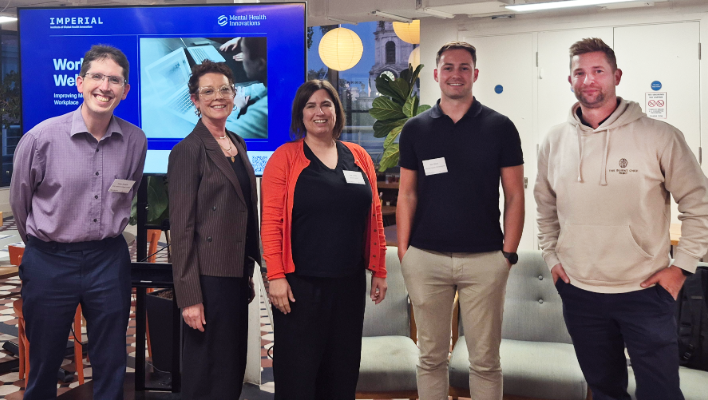We were delighted to mark the launch of our latest report ‘Working Well: improving mental health in the workplace’ at wagamama HQ last night, joined by partners, people with lived experience and key stakeholders in the mental health sector.

From left to right: Peter Howitt, Imperial College London, Sarah Kendrick, Mental Health Innovations, Nat, Mental Health Voice Group member, Ben West, Shout Volunteer and mental health advocate, Kris Hall, Founder of Burnt Chef.
The report, the second in our series with Imperial College London’s Institute of Global Health Innovation (IGHI), highlights the pressing issue of increasing numbers of people unable to work due to their mental health. The findings explore the wide range of factors related to mental ill-health that prevent people being able to work, and sets out key recommendations for employers, academics and innovators on how to address the urgent need for change.
Speaking about the report, Melanie Leis, Director of Policy and Analysis at IGHI’s Centre for Health Policy and co-author, said: "This is the second in a series of reports that we are co-producing with Mental Health Innovations, and we are pleased to continue this important partnership. Together, we are working to better understand the mental health needs of people in the UK and develop practical, evidence-based recommendations for policymakers, system leaders, industry, and academia”.
The report found that more than three quarters (78%) of people said the reason they were unemployed was due to their mental health, while over a third (39%) said it was due to their confidence. However, 33% of respondents stated they never use workplace mental health and wellbeing services, with 22% indicating that such support is not available to them. Only 8% of respondents reported using mental health support often.
The report highlights key recommendations and tools employers can use to improve workplace wellbeing, as well as a toolkit to put practical solutions in place.
Victoria Hornby OBE, Chief Executive of MHI said: “There is a clear opportunity for government, employers and charities to work together to identify and scale the most effective ways of improving the mental health of those in and out of work. Our novel guide for employers, co-developed with people with lived experience of these issues, provides practical suggestions to make the process from job application to day-to-day work more supportive of mental health.”
During the event, attendees heard panel discussions focused on topics related to workplace wellbeing, including employer representatives from our partners wagamama, Serco and Working Families, as well as Waheeda Zafar, Julia Anderson Trainee Programme Lead at Imperial College London and our Trustee Helen Hopper, who runs consultancy firm h3.
The audience also heard from the workforce panel, comprising mental health advocate and Shout Volunteer Ben West, Nat a member of the Mental Health Voice Group (whose interviews formed part of the report findings), Kris Hall, Founder of Burnt Chef, and Sarah Kendrick, Clinical Director at MHI.
A key theme that emerged from the panel discussion was around how managers can make a difference to workplace wellbeing, from being able to have conversations with their employees, to really asking how someone is doing, using mindful language and being able to create a space where people feel seen, heard, understood and ultimately supported.
John Conyers, Culture Lead at wagamama spoke about how by partnering with our Shout text service, they are able to support employees beyond their Employee Assistance Programme (EAP), highlighting how they were fostering a culture of trust within the organisation where employees know they have a confidential and anonymous space to talk.
Through our digital training, tools and services, we offer a range of opportunities for employers to improve the mental wellbeing of their workforce. To find out more contact our team below.


